Even though rabbits love fresh vegetables, you have to check whether the conditions are right for them before including any type in their diet. For instance, broccoli is regarded as a superfood because it contains many beneficial nutrients but produces gas, making your rabbits’ stomach distend. In light of this, should you give your rabbits broccoli or not?
Is Broccoli Good For Rabbits?
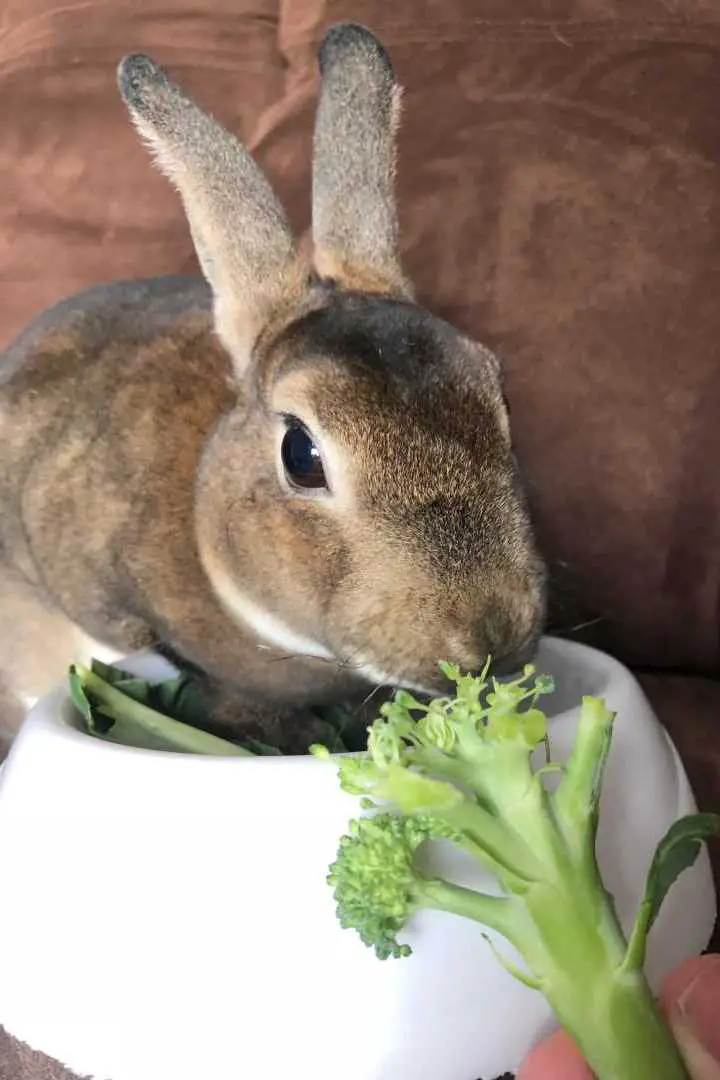
First, broccoli belongs to the cruciferous vegetable class because they resemble a cross. Other vegetables in this group are arugula, Brussel sprouts, kale, spinach, cabbage, etc. They are majorly known for fighting cancer, reducing bad cholesterol levels and inflammation, and boosting the immune system. No wonder they are often called superfoods.
Broccoli has over 20 varieties, but they are majorly grouped into early season broccoli varieties, mid-season broccoli varieties, and broccoli rabe.
The early season broccoli varieties include blue wind, Amadeus, Arcadia, Gypsy, De Cicco Heirloom; mid-season broccoli types are diplomat, express, fiesta, while Quarantina and Spigiarello Liscia are in the broccoli rabe group. Your rabbits can eat any variety as long as it is edible for you.
Not only is broccoli suitable for your rabbits, but rabbits are also lovers of fresh vegetables. They likely won’t turn up their noses if you give them broccoli. If your rabbit does, that means it doesn’t like it.
First, feed your rabbit a teaspoon of broccoli to see if it likes it or not. If it does, you can incorporate broccoli into its diet. However, don’t feed broccoli to a rabbit under six months as their digestive organs have yet to be strong enough. Feed baby and juvenile rabbit their recommended food only.
Raw or Cooked Broccoli For Your Rabbits?
Rabbits can eat both raw and cooked broccoli. However, cooking your vegetables reduce their nutritional content because of the exposure to heat. If you want your rabbits to enjoy all the nutrients, you can serve them raw. But cooking also makes vegetables more tender for your rabbits to chew. You can mix broccoli with other vegetables for your rabbits in small quantities.
Can Rabbits Eat All Parts Of Broccoli?
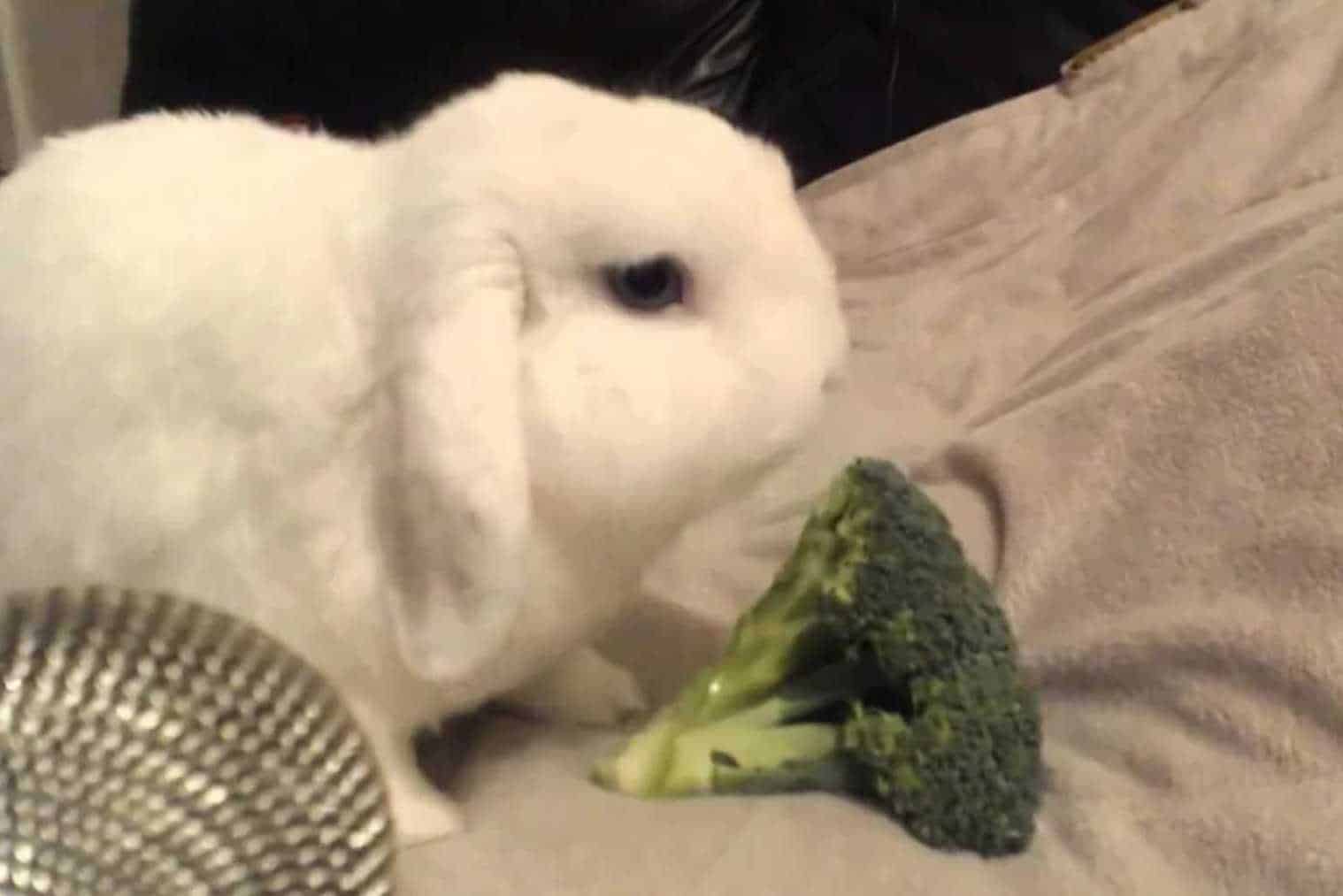
Even though broccoli is good for your rabbit, you should take note of some essential things. Some cruciferous vegetables, such as broccoli, produce gas because of the raffinose present in their fiber content, making you feel bloated, especially when eaten raw.
Other examples are kale, asparagus, and cauliflower. But not all parts of broccoli contain the same amount of this undigested sugar, raffinose.
For instance, the stems and florets have more gas than the leaves, so you should feed your rabbits broccoli leaves. You can also give them the other parts, but in smaller quantities, provided your rabbits aren’t allergic to them.
As much as possible, stay away from giving your rabbits foods that produce gas because they make your rabbits bloated. Since rabbits are fragile animals, bloating disrupts the working of the blood vessels in their bodies and can lead to a life-threatening condition.
Your rabbit can’t vomit what it has eaten, worsening the case. In fact, before incorporating broccoli into your rabbit’s diet fully, feed it a teaspoon of the vegetable and check if its stomach distends or its appetite decreases. If any of this happens, broccoli isn’t a suitable food for your rabbits.
5 Benefits Of Feeding Your Rabbits Broccoli
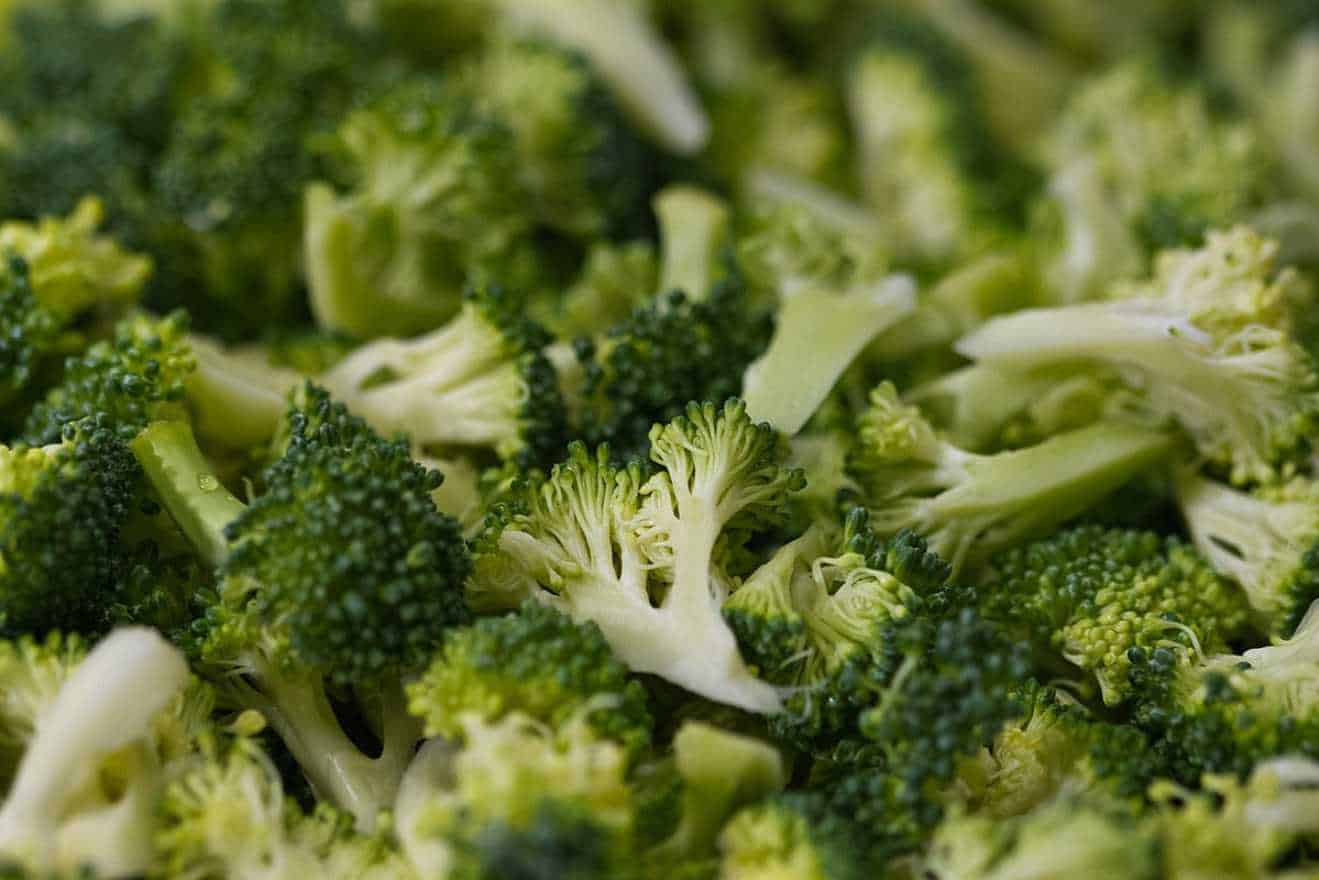
Packed with many vitamins and minerals, broccoli is a nutritious vegetable that enhances your rabbit’s health. Below’s a table quantifying the nutrients for a cup of this chopped superfood:
| Name | Amount |
| Fiber | 2 g |
| Protein | 2.5 g |
| Vitamin C | 81 mg |
| Vitamin K | 93 mcg |
| Vitamin A | 567 IU |
| Magnesium | 19 mg |
| Potassium | 288 mg |
| Folate | 57 mcg |
| Fat | 0 |
| Iron | 0.66 mg |
| Phosphorus | 60 mg |
| Zinc | 0.37 mg |
| Calories | 30 |
| Calcium | 43 mg |
| Carbohydrate | 6 g |
Here are more details about the benefits of broccoli for your rabbits:
- Boosts immunity: rabbits are very fragile animals, and they need all the immunity they can get. Broccoli is packed with antioxidants such as vitamin C and other minerals that help reduce disease risks and strengthen the antibodies in your rabbit’s blood. As such, the chances of your rabbit getting ill decrease by at least 50%.
- Promotes healthy heart and skin: if you want your rabbit to be healthy and fresh, broccoli is the secret you’ve been looking for. Minerals such as folate and iron help enhance the heart’s condition, thereby making it difficult for your rabbit to develop heart diseases. In addition, sulforaphane minimizes the effects of ultraviolet rays on your rabbit’s skin, while vitamin C strengthens skin lesions and collagen.
- Improves eyesight: vitamin A, zeaxanthin, and lutein in broccoli help fight eyesight problems while maintaining a perfect eye condition
- Prevents high blood pressure: rabbits can develop high blood pressure, but the chances are reduced if you incorporate broccoli into their diet. This is because broccoli contains sulforaphane which fights hypertension in rabbits. Besides, it is low in fiber and carbohydrate and has zero fat, making it perfect for any living organism.
- Promotes dental wear: dental problems such as overgrown teeth are very common with rabbits, and not treating these can lead to death. As such, it’s recommended you include foods that promote dental wear in your rabbit’s diet, and broccoli is an ideal food due to its crunchiness. Besides, the nutrients in the vegetable can help prevent possible teeth infections.
How Do You Feed Your Rabbits Broccoli?
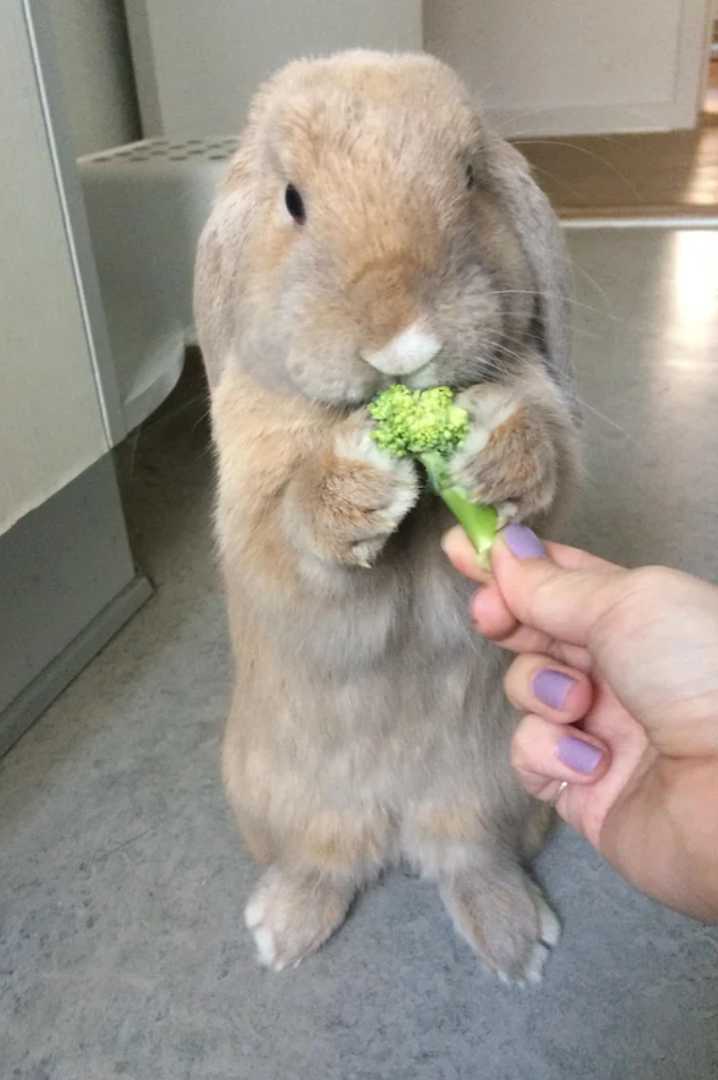
Even though broccoli is good for your rabbits, there’s a guide to follow when serving them.
- Feed your rabbits bit by bit: don’t push the whole broccoli down their throat at once, even if they can eat the stalks and florets. Chop the broccoli into pieces they can nibble. If your rabbits eat these parts, you can serve them the leaves first and the stalks and flowers later.
- Only give broccoli to adult rabbits: as mentioned earlier, don’t feed baby rabbits broccoli. The gas it produces can be too much for them to handle. Instead, follow the recommended diet for them. You should be careful when feeding adult rabbits as well. One teaspoon per day is enough for them. Why? Broccoli isn’t a major food in rabbits’ recommended diet (good hay, grass, and clean water). You can also have small amounts of pellets and vegetables. As such, broccoli should be considered a treat, which should not make up more than 10% of their diet.
- Look out for your rabbit’s sensitivity: although rabbits generally love vegetables, each rabbit has its peculiarities as well. Some are sensitive to cruciferous vegetables like broccoli; some can only eat the leaves, while others can eat all the parts of broccoli. Know the category your rabbit falls into and handle it accordingly. Don’t just feed your rabbits any food blindly.
- Choose organically-grown vegetables: whether you’re feeding your rabbits broccoli or other vegetables, go for organically-grown ones. Inorganic vegetables are grown with chemicals that cause harm to animals and humans alike. You can check grocery shops or buy from a farmer for organic vegetables. At best, if you have the time, you can grow broccoli or any other vegetable on your property.
- Choose healthy broccoli when buying: you must look for the signs that show that the broccoli you want to buy is in good condition before paying for it. For instance, healthy broccoli smells fresh, has a uniform green color, and feels firm to touch. If it has yellow spots or a rotten smell, that means it’s starting to decay. The rule of thumb is to ensure you don’t feed your rabbits what you cant eat.
Should You Only Give Your Rabbits Broccoli?
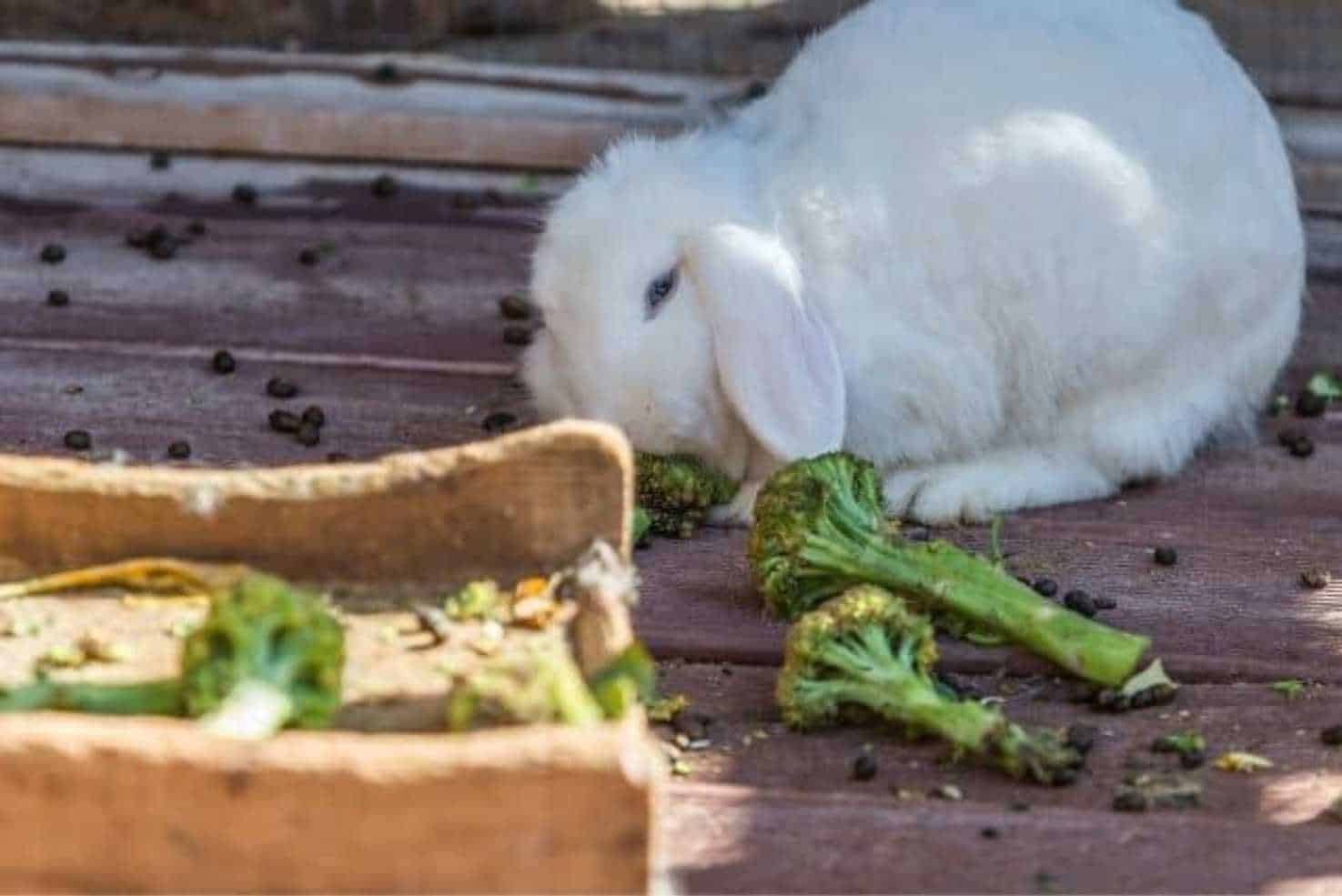
There are several other foods you can give your rabbits apart from broccoli. Don’t stick to feeding your rabbits one type of food; create varieties in their diet so that they can have adequate nutrition and not get tired of eating only one kind of food.
- Other cruciferous vegetables: rabbits can eat asparagus, spinach, cauliflower, kale, cabbage, etc. However, don’t forget these vegetables produce gas, so you want to serve them in tiny quantities as much as possible. Also, ensure they are in the best condition, organically grown, and chopped into smaller pieces before serving your rabbits.
- Root vegetables like carrots: rabbits love carrots because of their sweetness but don’t give them the whole stalk. Carrots have high sugar content, increasing the risk of high blood pressure in your rabbits when consumed excessively.
- Fruits like apples, pineapples, etc.: These fruits should be served in little quantities to your carrots and not often like carrots. Remove the seeds as rabbits’ stomachs can’t digest seeds.
Sometimes, rabbits also nibble on the leaves and the bark of trees. Therefore, ensure they’re in an environment where the vegetation isn’t poisonous. Always consider any other food asides hay, pellets, and water as treats to be on the safe side. Here’s a video on safe foods for your rabbits:
Summary
Generally, rabbits won’t turn up their noses at vegetables such as broccoli, but this doesn’t mean that all vegetables are good for them. It’s your responsibility as a rabbit breeder to find out what your rabbit likes and whether it is beneficial to them or not. Once you find that broccoli is good for your rabbits, don’t hesitate to stick with the feeding tips to avoid problems.
